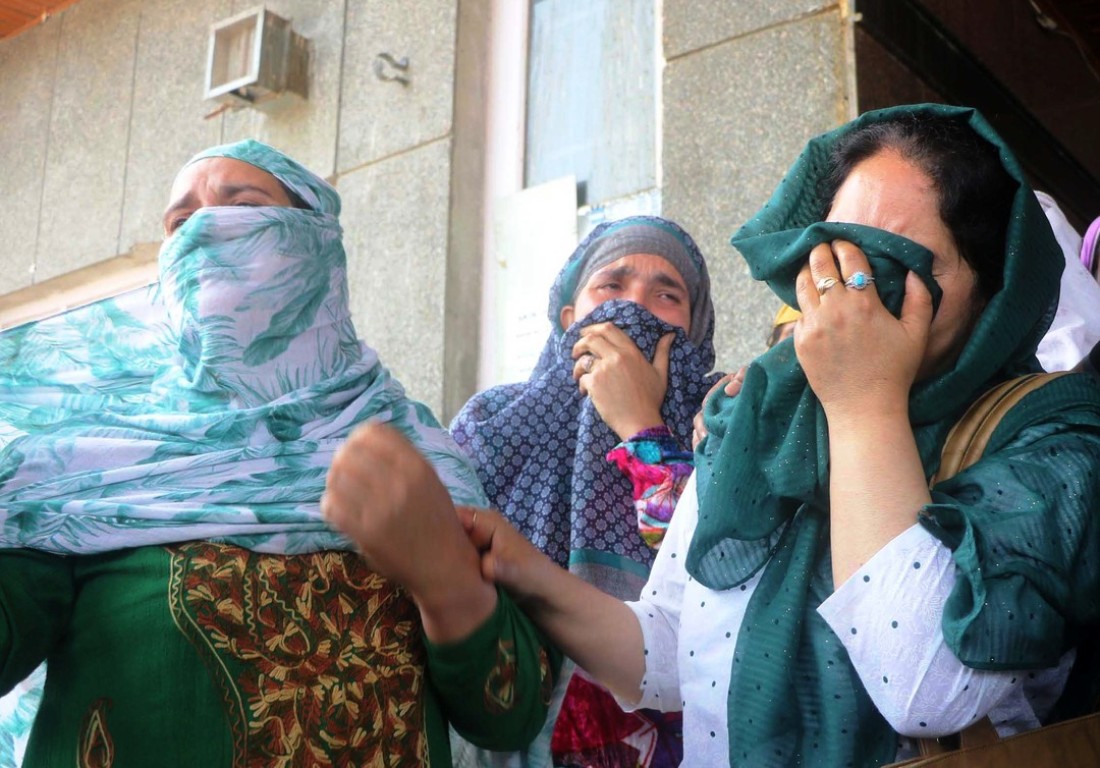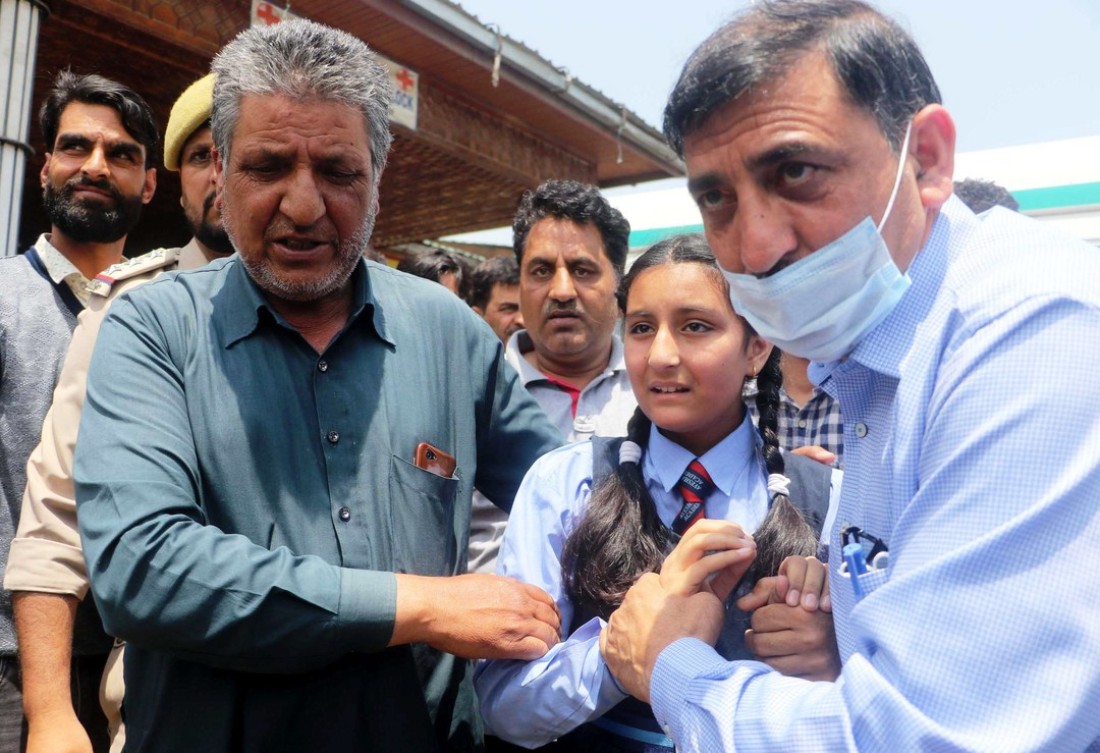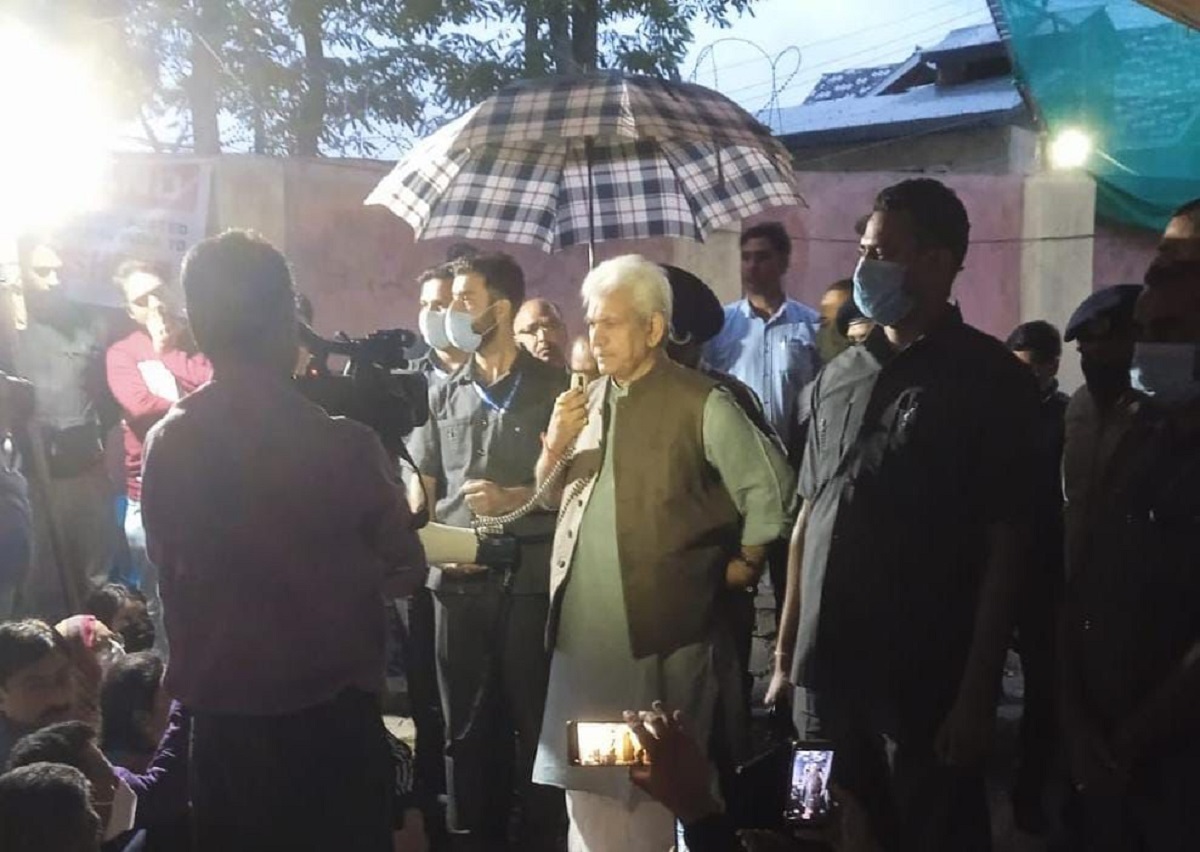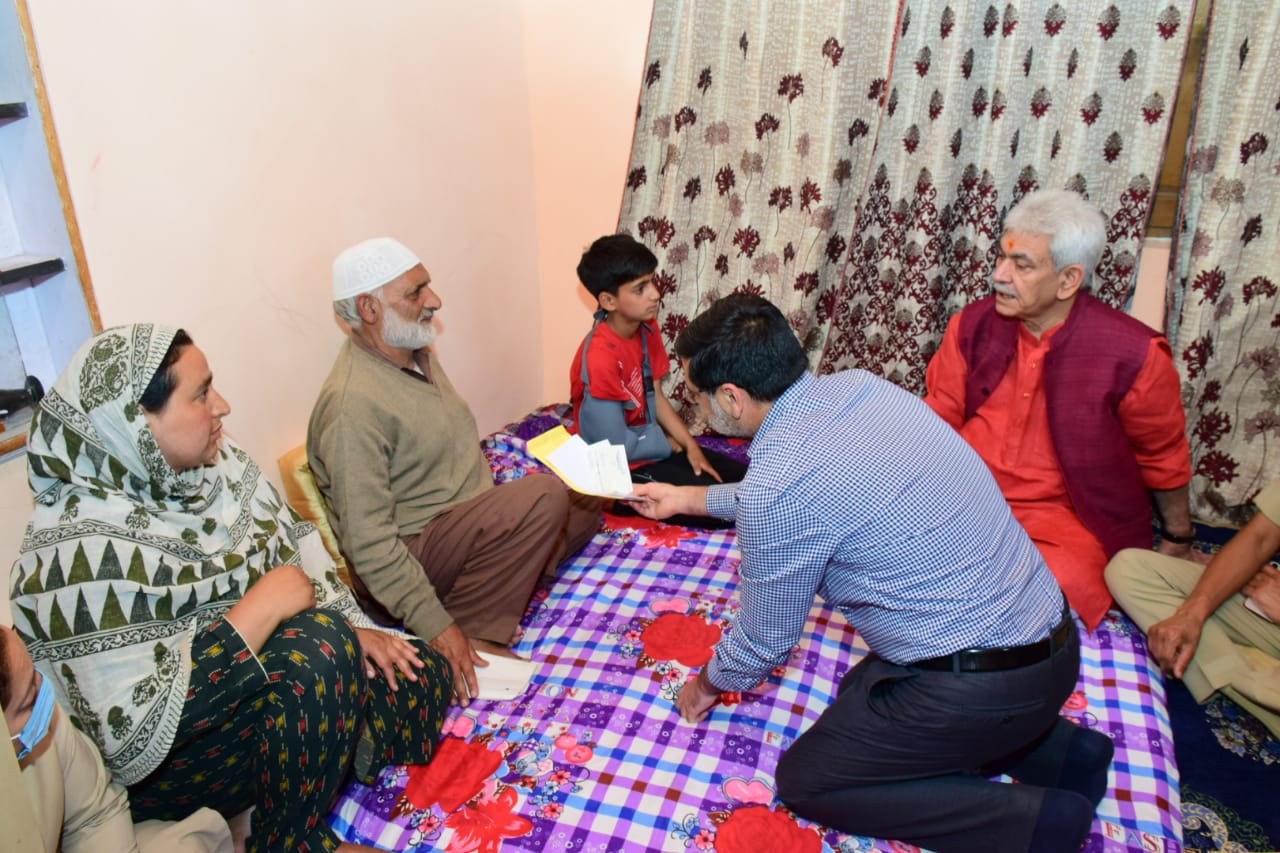Sections within non-local staffers and migrant Pandits serving Kashmir have left the Valley in wake of a series of targeted killings. The government says it will improve the security situation, create more safe zones and discourage their flight as the security apparatus has an upper hand, reports Masood Hussain
On June 2, Vijay Beniwal, 29, was sitting on his chair in Arreh village when a young masked man got in and quickly returned only to return within a minute, the CCTV footage of the murder shows. When he returned, within a fraction of a minute, he fired on the banker from a very close range. Beniwal’s colleagues quickly evacuated him to the district hospital in Kulgam where he was declared dead.
Beniwal, a resident of Bhagwan, in Rajasthan’s Hanumangarh district, was the branch manager of SBI-sponsored Ellaquai Dehati Bank (EDB), a Regional Rural Bank, as a manager of a small branch. He was a clerk and then he had passed an examination to become a banking Probationary Officer (PO) and was posted in Kashmir in 2019. Now, he was preparing for another examination to get elevated to a senior position so that he could be posted outside Kashmir.
Regardless of the situation emerging in Kashmir, Beniwal was not terrified. When he spent almost a fortnight with his wife after marrying on February 10, he told Manoj Kumari that bankers in Kashmir are no targets. He convinced her that it is peaceful enough for their honeymoon. It was on April 24, when Anil, his younger brother, accompanied Kumari to Kashmir. They spent many days in Pahalgam and prayed for happy conjugal life at Vaishno Devi too.
Beniwal’s broad daylight murder came as part of the enigmatic chain of killings targeting the resident and non-local minority community members. Barely two days ago, on May 31, militants shot dead Rajni Bala, a school teacher, literally at the gates of her state-run High School at Gopal Pora, not far away from Arreh. A resident of Samba in Jammu, she was dropped there by her husband, Raj Kumar, also a teacher, then posted at Mirhama, when she was fired upon in an orchard.
The Samba teacher couple (from Nanak Chak village) was serving the area since 2009, after being appointed under the reserved category (Kashmir lacks any SC population and the positions are getting candidates from Jammu since 2007). They were living in Chawalgam in rented accommodation and were raising their daughter Sana Attri who was studying in a private school. What was tragic in the murder was that both the teacher had been shifted to a safe location at their request and it was supposed to be Bala’s last day at this particular school.

Targeted Killings
Though killings in Kashmir have never moved away from the newspaper front pages, there has been a spurt in targeted killings in the last few years, especially after 2019. Interestingly, it is central Kashmir’s Budgam district where most of these target killings took place in its recent wave. Singling out minority communities is the newer dimension of the more than three decades old strife. There were nine targeted killings since May 1, 2022. This has triggered unprecedented insecurity among hundreds of migrant Kashmiri Pandits (KP) who had availed of the Prime Minister’s special package – launched in the Congress era, to return home and start serving Kashmir, their home. Since 2010, almost 4500 employees were appointed and deployed in Kashmir of whom around 1100 live in transit accommodations and the rest in rented spaces.
Some of them had started investing in the reconstruction of their homes on the lands they own. There were a number of newly constructed homes in the Mattan area where families had followed the specially appointed employees. They have also started leaving. The New York Times quoted Sandeep Raina, 38, an engineer, saying that when 1990 they migrated, he was eight years old. For two decades, he moved from place to place before finally returning home a decade ago to take up a job, build a home and start a family. “I have spent my whole life in migration. Who would like to be dislocated again and again?” he said as his eight-year-old son was watching the conversation. “But now we can’t live here. We will be killed.”
Ever since the killing of Rahul Bhat, a revenue clerk, in Chadoora, the KPs have been on the roads, seeking relocation out of Kashmir. Though the government delivered on the promise that they will be moved out from vulnerable areas to comparatively safer areas, mostly urban, they never felt convinced. With every new killing, the tensions mounted and the protests surged. This was despite the fact that LG Manoj Sinha visited Sheikhpora and had a detailed interaction with the protesting employees in Raj Bhawan.

After the twin Kulgam killings, the government deployed security forces outside their transit accommodations to prevent them from fleeing to Jammu. Cops prevented the migration during the day but failed to act during the dead of the night.
In a heavily guarded Sheikhpora transit camp in Budgam, not far away from Srinagar, reports appearing in the media said only 30 of 400 families are there now. The situation is not very different in other places. Of the 120 families in the Kupwara camp, more than 100 have left for Jammu. At Vessu camp in Anantnag, nearly 350 of the 600 families have left. In Baramulla, more than 60 of the 120 families have left, Chandigarh based newspaper, The Tribune quoted a senior KP leader saying.
Enigmatic Campaign
What makes the current killings different is that the KPs who stayed put in the 1990s are shattered. Pharmacist Bindroo’s killing last year was the first major blow to the confidence they had grown with.
The Indian Express traced a family in an old city that never felt the requirement of migrating out of their ancestral home. After the recent killings, when some officials rang up the family asking if they wish a transfer to a safer place, the wife, a teacher, refused. Though putting a brave face, the family has understood the net difference between the 1990s and now. The newspaper quoted the family head saying: “The difference now is that neither the person behind nor in front of the weapon is clear.”
“In the 1990s, we knew where there was a greater degree of threat to life,” a newspaper quoted Sunil, a KP employee saying. “This time we are not sure which place is safe.”
Now Sanjay Tickoo, the leader of Kashmir Pandit Sangharsh Samiti (KPSS), a body of non-migrant KPs, has moved the High Court seeking a direction for the government for relocating all religious minorities from Kashmir. Besides, he demanded an investigation into all the targeted killings in the last eight months. “All the officers and officials whose involvement or lapse is proved in the preliminary allegations should be suspended without any further delay. A Special Investigation Team (SIT) should be constituted to submit its report within a stipulated time and it should be monitored by the High Court,” he wrote in the letter listing the chronology of the killings and the threats that are circulating on the social media.
With the migration, the protests are now erupting in Jammu. The eight per cent recruitments made under the SC category since 2007 for Kashmir have constituted their body and are on roads in Jammu for the last three days. They say they never faced a problem in all these years but now the situation seems to have changed.
“We are not going to return to Kashmir and would prefer dying here (Jammu) rather than there,” one of their protesting leaders said. “Where are the safer zones in Kashmir? We have to move out, drop our children at local schools and attend to our duties.”
Political Response
Regardless of what the non-resident politicians talked about the crisis, the local political class of Jammu and Kashmir reacted differently. They link the killings with “fake” normalcy claims, improved tourist footfalls and an avowed muscular policy.
These “act of cowardice”, Mehbooba Mufti said in one of her reactions to a minority member killing, plays “into the vicious anti-Muslim narrative spun” by BJP. She said the “fake claims” of normalcy do not withstand as “targeted civilian killings are on the rise”.
“Our brothers and sisters are being targeted under daylight, but the Government has its head in the sand,” Dr Farooq Abdullah, Jammu and Kashmir’s five-time Chief Minister said. “This ostrich approach will push the situation to a point of no return.”
Words of condemnation and condolence, Omar Abdullah wrote on Twitter “ring hollow” as do the “assurances of the government that they will not rest till situation normalises”. May the deceased rest in peace.”
People’s Conference chief Sajad Lone said Kashmiri is scared “from all sides” including the state. “A certain level of violence never left Kashmir it has always been there. Violence has to be countered operationally and psychologically,” Lone told India Today. “And psychologically, things have gone from bad to worse in Kashmir since the abrogation of Article 370. Officials use an overtly muscular language here now. To fight terrorism, you need to encourage locals [to help], not scare them.”
Harsh Dev Singh, former Panthers Party minister, who migrated to Aam Admi Party, barely two months before the party founder, Bhim Singh, died, said the Centre’s “proxy rule” had completely failed in dealing with the Kashmir situation.

“Bank manager, teacher and other people are being killed. Kashmiri Pandits are fleeing. Those responsible for their security are busy promoting a film,” Rahul Gandhi tweeted. “The BJP has used Kashmir as a ladder for power. Mr Prime Minister, take immediate steps to restore peace in Kashmir.”
Almost the same sentiment is shared by others. “They (BJP leaders) were claiming that after revoking the special status to Jammu and Kashmir everything will be normalised there. Then why did that not happen? They had time to watch Kashmir Files, but now why BJP and RSS are silent when Hindus are being killed there?” Chhattisgarh Chief Minister Bhupesh Baghel was quoted as saying. “The important thing is that their strategy on Kashmir has completely failed. What they thought was not right.”
Government Response
The two voices are in unison, the BJP and the government of India. Both believe the situation is not out of control and these targeted killings in which Muslims also are killed will be contained. As many as 16 targeted killings, including cops, teachers and sarpanches took place in 2022, so far.
“As Jammu and Kashmir is moving towards peace and progress under the leadership of Prime Minister, Narendra Modi led Government, frustrated Pakistan and its supported terrorists hatched a conspiracy to sabotage the efforts by creating fear among the people,” BJP’s JK president Ravinder Raina said in Jammu, revealing the operation was codenamed as Operation Red Wave. He claimed Pakistan intends to create Afghanistan like situation in Kashmir.

After insisting repeatedly that 2414 kanals of land encroached upon by vested interests post-1990, 6500 of the 7968 KP claims to properties stand settled, the government ensured that no political speech lacks a reference to the return of KPs home. Both these processes were in vogue even before the BJP rule but things were taking place at their own pace and without any noise. Coupled with tourist footfalls and the abrogation of Article 370, all these developments continue to be the base of the “peace” construct.
After the recent killings reinforced the insecurity, Home Minister Amit Shah presided over a high-level meeting in Delhi, which reiterated all these things: the arrival of a million tourists, recruitment of 5500 KPs under the PM package in 2015; making secure arrangements for 10000 non-Muslims serving the government in Kashmir. The final decision was that the administration cannot encourage migration by repeating the 1990s.
Media reports quoted unnamed officials saying that the administration cannot be a party to any “ethnic-cleansing” scripted from across the border by agreeing to the KP demand that they be shifted out of Kashmir. They said they will be able to contain the targeted killings as they did in October 2021.
Quoting sources, it was reported that eight safe zones with tight guards are being established for housing KP and other non-local employees.
The meeting discussed in detail the 43-day Amarnath Yatra, which is expected to get eight lakh pilgrims to Kashmir. The centre has already sanctioned the deployment of 350 companies of paramilitary forces.















